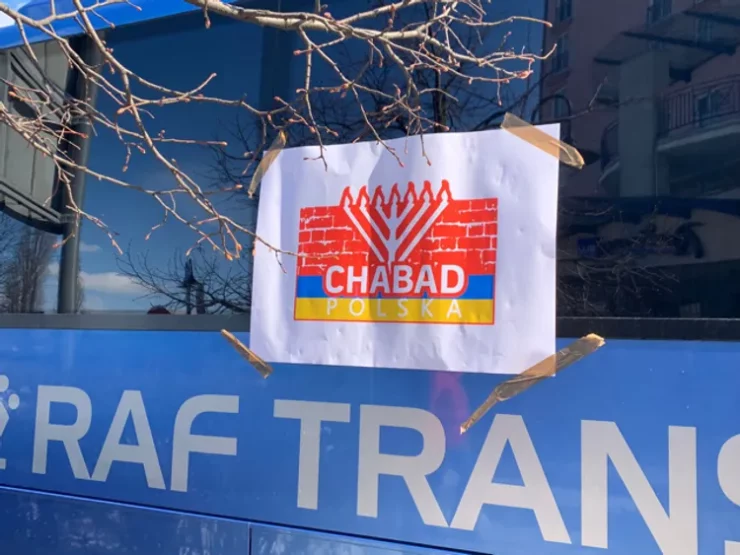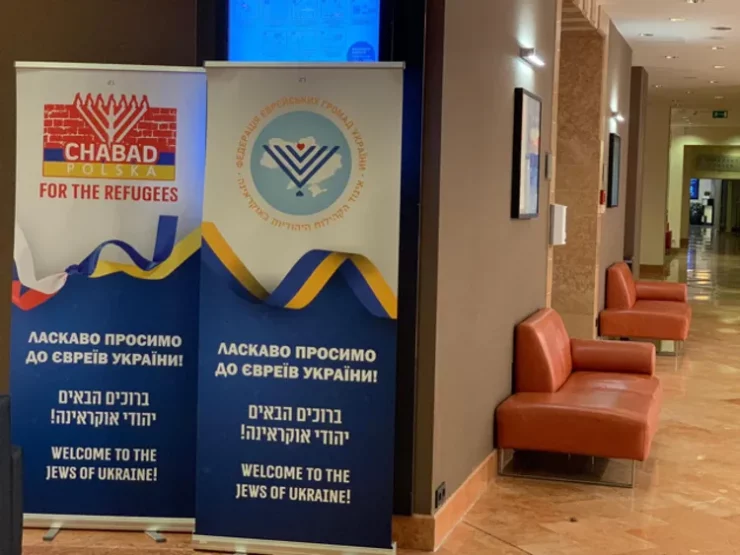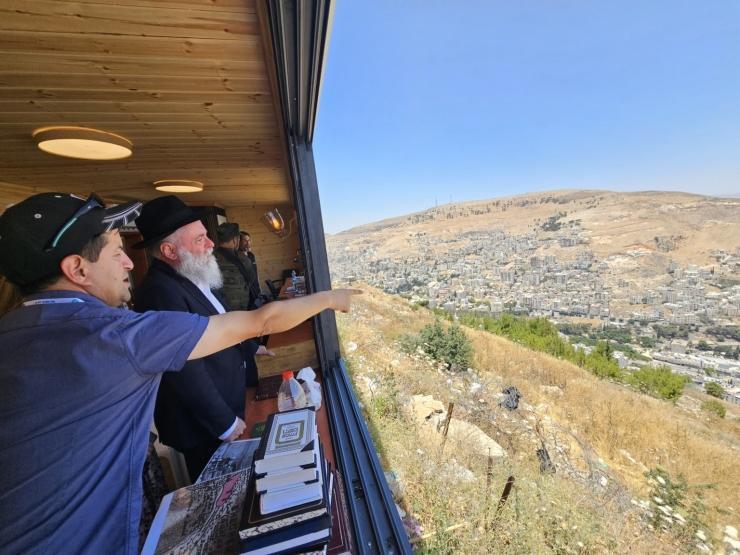Chabad of Poland on the Front Lines of Ukraine Humanitarian Crisis
More than a month after the launch of Russia’s invasion, thousands of refugees have already left Ukraine. Some joined makeshift camps, others flew to Europe or to Israel. And then there are those, Jews for the most part, who are taken care of on an ad hoc basis by associations such as the Chabad of Poland • Full Story, Photos, Video
You can support Chabad of Poland’s vital work by clicking here.
i24News
More than a month after the launch of Russia’s invasion, thousands of refugees have already left Ukraine. Some joined makeshift camps, others flew to Europe or to Israel.
And then there are those, Jews for the most part, who are taken care of on an ad hoc basis by associations such as the Chabad of Poland.
Matthias Inbar, an i24NEWS journalist specializing in defense issues, met some of these people during a private visit to Warsaw. He recounts this particularly rich experience on an emotional and human level.
This is the story of lives interrupted by the sound of bombs. Lives that refused to submit as death reached out for them.
It’s impossible to know what these refugees went through without starting a conversation with them. However most of them speak only Ukrainian, a few words of English at most.
Our interpreter will be Rabbi Shalom Gopin, head of the Chabad community in Kyiv. He is also a refugee, now for the second time in his life.
The religious leader was already forced to leave the east of the country in 2014, after the war in Donbas began. Years of his life, 17 in total, along with a house, a neighborhood center, a school and a community: all went up in smoke.
“It’s as if the roots of the earth had detached from our feet,” says Gopin’s wife.
They then chose to leave for Israel. But after two years in the country, they decided to consult their children to find out what they preferred: to stay in the country where milk and honey flow, or to start from scratch and settle again in Ukraine, in Kyiv, this time.
“Who would have thought a few years later, the war would catch up with us and once again show us the way out?” she says. “But I have no doubt, this departure will be temporary, we will come back very soon once the war is over.”
Not far from the rabbi’s wife is a mother with her four children. One is young, another has just celebrated his bar mitzvah under the bombs, without friends. Their father stayed in Ukraine.
Their mother remains dignified, despite her apparent exhaustion. Her 15-year-old son takes care of his brothers. “I want to go back to Dnipro, it’s my home. I have a mission,” the teenager tells me, with astonishing maturity.
I meet these people while I am in a hotel in the center of Warsaw, one of the establishments rented by Rabbi Shalom Stambler, emissary of the Lubavitch-Chabad movement in Poland.
For more than a month, he and his wife Dina have welcomed Ukrainian refugees day and night, providing several hundred meals a day. Not to mention the management of Airbnb-type accommodation that they also rent out all over the city to accommodate refugees.
On this Friday evening, a small conference room in our hotel serves as a synagogue. Among the faithful regular temple goers, others cannot read Hebrew. They are given bilingual prayer books and Rabbi Gopin guides them, in Russian.
“Page 122, you have to stand up. Page 135, sit down. Now we are going to read the passage from the Torah,” he tells them. For these Jews far from any tradition, it is a new world. The looks are astonished, surprised, lost.
My eyes fix on an elderly man. Yossef Lifshitz, is seated next to his son, Pavlik. Describing himself as an atheist, he would later tell me that he grew up in Dnipro, in central Ukraine.
His grandfather, a religious Jew, was killed by pro-Nazi Ukrainian soldiers in 1941. Yossef was born four years later, in 1945. His grandmother raised him in the Jewish tradition transmitted by her late husband, before Soviet education, and therefore communism, prevailed over Judaism.
It’s hard to say that Yossef follows the prayer, he is present and listens. But suddenly, as Rabbi Shalom begins to sing and dance to a typical Ukrainian Jewish song, his eyes genuinely light up. He gets up and starts dancing too. Happy, he is brought back to his early childhood, when his grandmother said to him in the synagogue: “Here is the seat on which your grandfather sat.” Then the song ends. Yossef sits down again and immerses himself in this prayer book that he does not know. I am fascinated by this man.
During the service the next day, Saturday, Rabbi Shalom called Yossef to “come to the Torah.” “Yossef, son of?” asks the rabbi. “Moishe,” Yossef replies.
The old man stands before the Torah scroll but doesn’t know what to say or what to do. A young refugee rushes to help him. The rabbi asks Yossef in amazement, “When was the last time you read a Torah passage?”
“Never,” he replies.
Yossef has just celebrated his bar mitzvah, 64 years late. Tears come to his eyes with happiness. The assembly dances and celebrates this unique moment to the sound of “Mazal tov!”
At the same time, a man in his thirties arrives at the office. His name is also Yossef. He looks worn and tired, but happy.
Rabbi Mayer Stambler, brother of Rabbi Shalom, informs me that Yossef’s wife left Ukraine alone when she was nine months pregnant, begging her husband to join her as soon as possible.
At the end of the prayer, Yossef recounts his journey. “Thanks to Heaven I obtained permission to leave Ukraine at the last moment to join my wife, and be present for the birth of my son,” he says.
“In a week, we will celebrate what will undoubtedly be the first circumcision of a Ukrainian Jewish refugee baby,” he rejoiced, thanking the leaders of the Chabad movement in Poland for offering their help.
It was Dina, the wife of Rabbi Shalom Stambler, who personally accompanied Yossef’s wife to the hospital the day before for her delivery.
Roman is silent. He hardly speaks, but smiles from time to time. He was badly wounded in one hand by shrapnel or a bullet, and the hand could not be saved. It had to be amputated in a hurry. He too dreams of returning home to Ukraine.
Sunday, during morning prayer, Yossef, the “young” 77-year-old bar mitzvah, puts on phylacteries for the first time, wrapping the leather chords around his arm in preparation for prayers. Roman also agrees to put them on. One of the young boys whose father remained in Ukraine helps him as best he can.
Yossef, the new father, looks at his phone to find out about his wife’s health. It is 11:30 am and these refugees are preparing to leave the hotel to go to another establishment which will welcome them for “as long as it takes,” explains Rabbi Mayer Stambler.
A whole organization. These refugees are somewhat tired of being tossed about, but grateful for the help they are receiving. The buses in which they board are all stamped “Movement Chabad Poland.”
Before leaving, I wish them the best. A better life. One of the young people replies that he has planned to pick up his things in Ukraine the next day. How? He prefers not to answer.
I meet at the same time a former American special forces soldier, deployed several times to Iraq and Afghanistan, now volunteering to fight alongside the Ukrainian forces.
It’s time for me to leave for the airport, where a flight is waiting to take me back to Israel. I leave charged with this strength transmitted to me by these men, women and children who apparently have nothing left. Yet they still held onto hope.
In a few days, they will celebrate Passover together, the holiday that marks, in Jewish tradition, newfound freedom.






54
Join ChabadInfo's News Roundup and alerts for the HOTTEST Chabad news and updates!








































